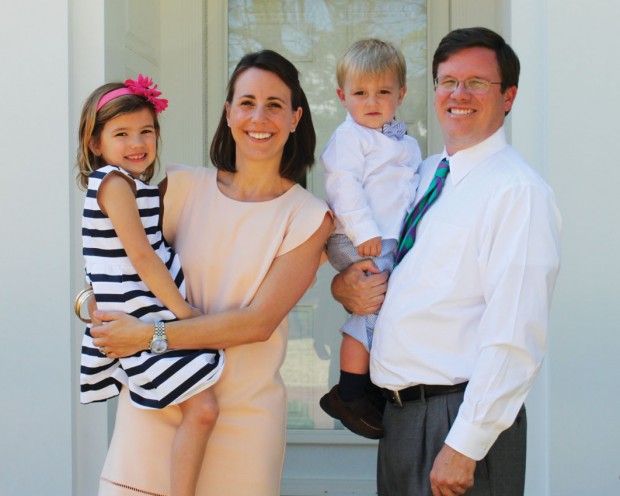Postpartum Depression
When joy turned to anxiety, she found help


Beth Rogers (pictured, with her husband Todd and children Abby and Carter) experienced postpartum depression after Carter’s birth in 2012. She is doing well now and wants to help other women by telling her story.
Welcoming a baby is one of life’s most joyous occasions. But what happens when not-so-happy feelings surface? After all, there’s the lack of sleep, emotional vulnerability and massive change that come with a new baby. A new mom may develop the “baby blues,” a bleak mood which is common and typically fades a few weeks after birth.
However, in nearly 15 percent of births, according to the National Institute of Mental Health, mothers experience a more severe mood disorder known as postpartum depression. It may be disguised as the baby blues at first – but the symptoms are more intense and last longer.
Buzz resident Beth Allen Rogers knows first-hand about postpartum depression.
The personal assistant with Ashley Goforth Design grew up in Houston and graduated from The Kinkaid School. She’s married to Todd Rogers, a regional sales manager for Enterprise Fleet Management.
Beth says she had never experienced any form of clinical depression, so it came as a surprise when she developed postpartum depression after the birth of her second child.
She remembers happy times with firstborn Abby. “I would go exercise, run some errands and then either pick her up from school at noon on her short days, or when she had long days, I would go home and eat lunch and take a nap.” Things were under control.
Then, in April 2012, after a smooth pregnancy, she gave birth to son Carter. Everything was fine, until about four days later. Abby came down with severe strep throat, and Carter developed digestive issues and would cry for 6-8 hours straight. Beth and Todd struggled to keep their newborn apart from his sick sister. Beth was forced to quarantine Carter to his nursery as he cried, and her toddler was miserable. Anxiety set in for Beth, and things went downhill.
“I started noticing [the postpartum feelings] when Carter was 2 weeks old. I was having terrible panic attacks. I was scared to be alone, which was a big sign because I am an independent person and never have had trouble being alone before. I knew things were not right,” Beth said.
She even developed a strange fear of choking. “I was afraid to even eat yogurt or applesauce. I could not lay down for a nap or go to sleep at night because I was so anxious. I would have panic attacks in my sleep, and every morning when I woke up after only a few hours of sleep, I had butterflies and nerves like I was about to go run a race.”
Beth knew this was hard for Todd too. “As a husband, you feel helpless because there was nothing I could do,” Todd said. “You feel like you lost a part of someone and begin to question whether you may have caused some or all of it in some way.”
“At first,” Beth said, Todd “did not realize how bad it was because I kept a lot inside, hoping it would just subside. He was very supportive of me and really stepped in helping with the kids and household duties.”
Beth made the decision to seek professional help and called Houston psychiatrist Dr. Joe Treadaway, recommended by a friend.
Beth needed a support team, so her family stepped in. Beth’s mom flew down from St. Louis and scooped up Beth and the two grandkids. Todd stayed in Houston and worked while Beth and the kids stayed in St. Louis for one month. She took her prescribed medication, which she credits as a lifesaver.
“I would talk to [the psychiatrist] every day from St. Louis. I thought I was going to never be myself again, and he would always reassure me that my hormones were out of whack and that I was not going to be like this forever,” she said.
After some time, the depression went away. Today, she says she is in a great place in her life. Her daughter Abby started kindergarten at Frostwood Elementary this fall, and Carter is a happy toddler.
“If I had to say one thing to other women out there [experiencing postpartum], please know that you are not alone,” Beth said. “You are not making this up in your head. It is real. There is such a stigma against antidepressants and anxiety medications. People take medicine every day for high blood pressure, thyroid problems and other medical conditions, and no one even thinks twice about that. Postpartum depression is a real condition, and most times you need medicine to help overcome it.”
She urges other women to not go through it alone. She even offered to speak (via email at [email protected]) with Buzz readers who want to share experiences.
“You need a strong support system,” she said. “Be good to yourself.”
Want more buzz like this? Sign up for our Morning Buzz emails.
To leave a comment, please log in or create an account with The Buzz Magazines, Disqus, Facebook, or Twitter. Or you may post as a guest.


